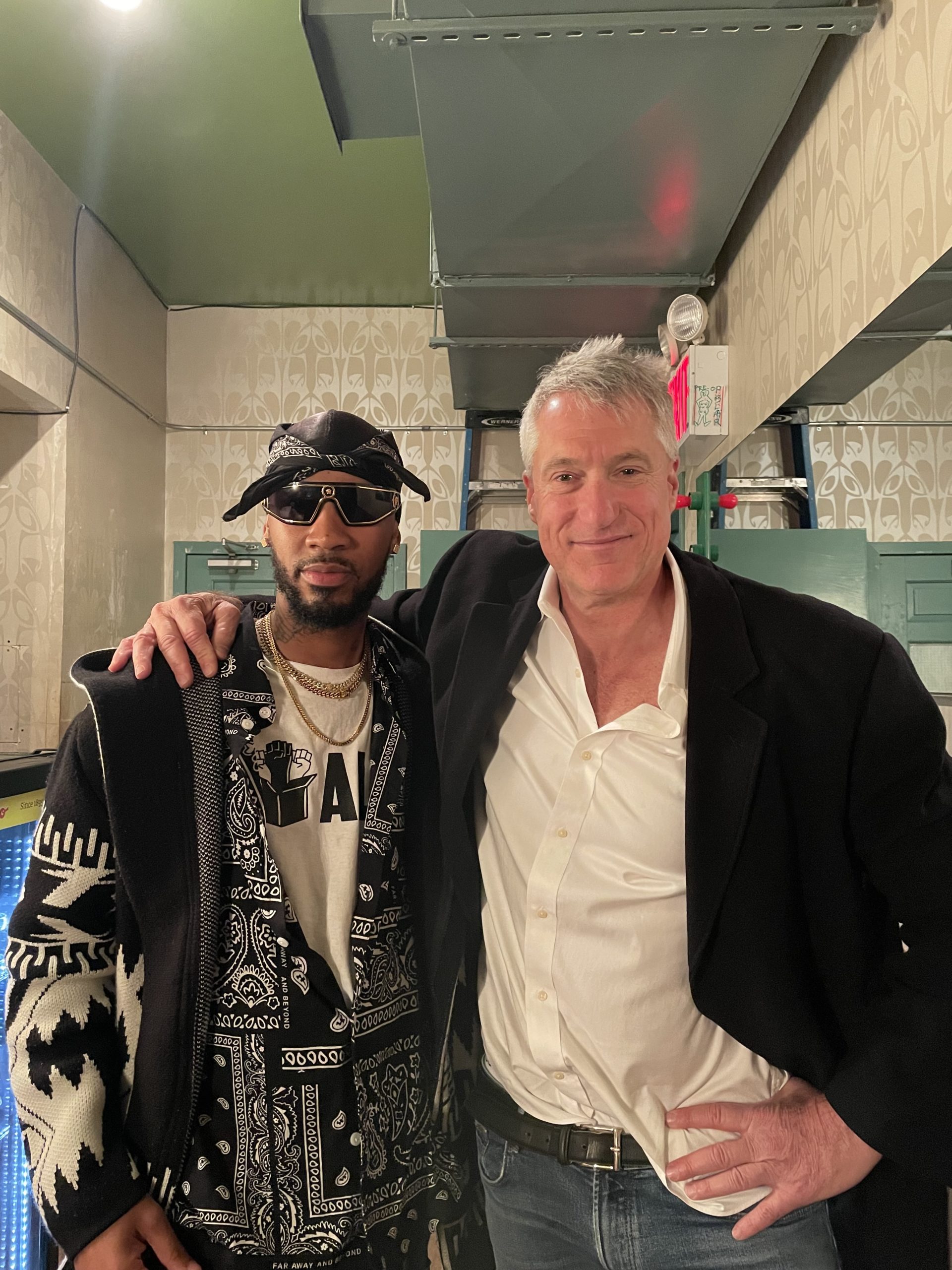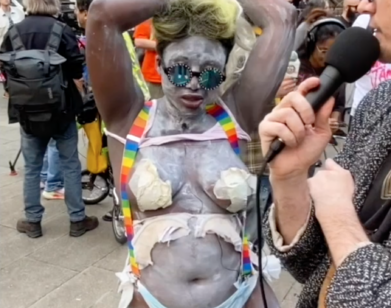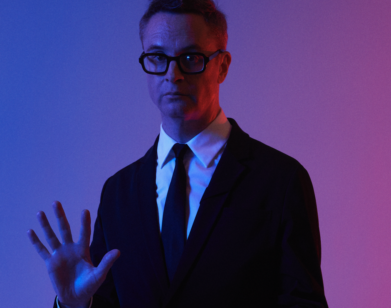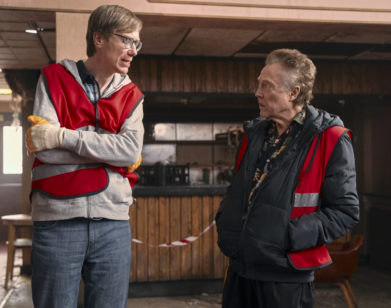worker's rights
Chris Smalls and Steven Donziger Aren’t Afraid of Amazon

When Steven Donziger, the American attorney famous for going to war with Chevron over environmental pollution in Ecuador, got released from what many believed to be an unjust house arrest in April, a fight for a different Amazon was brewing. Since being fired for protesting poor working conditions at a Staten Island Amazon warehouse in 2020, Chris Smalls, the rapper (he once toured with Meek Mill) turned founder of the Amazon Labor Union (ALU), has successfully unionized his old place of work, and triggered a tidal wave of activism across the nation. As the movement grows and pressures mount (Smalls recently received a personal invitation to the White House from President Biden), the activist has found a friend in Donziger, who knows a thing or two about intimidation tactics, community building, and staying true to yourself in times of intense scrutiny.
———
CHRIS SMALLS: Hi there.
STEVEN DONZIGER: Chris, it’s good to see you, man. I saw you met President Biden the other day. How did that go down?
SMALLS: It was a good experience. He claimed that I got him in trouble. I said, “All I did was organize.” If that got him in trouble then I’m gonna have to continue doing that.
DONZIGER: I think one thing we both have in common is our personal staying power in the face of corporate assaults on our reputations. In my experience, Chevron had a ladder of escalating attacks. They’d start on the first rung, and if that didn’t work, they’d keep going up to the point where they put me in prison. These corporations never want to discuss the real issues, they all want to go after an individual personally and try to make him or her the face of the problem to distract from the wrongdoing that they are engaged in. That’s what I experienced for years fighting Chevron over its pollution in the Amazon. How did that manifest in your campaign? I know they went after you personally.
SMALLS: Yeah. They tried to demonize me with the workers by spreading a whole bunch of lies and rumors. Of course, you’re gonna have people that believe this stuff. But to counter that, all I did was show up. When I was able to have my presence on the ground, and have face to face conversations with people, they realized that the things they were hearing about me were not true. They tried to paint it out like I had a vendetta against Amazon, that I’m only doing this for a meal ticket or something. When people see that I’m actually one of them, that I’ve been there, that I was in the same position as them in the building, they start to realize that the company is full of shit. That was how I got over the onslaught of union busting. And on top of that, I wrote a sincere letter to the workers. Out of 8000, 6000 of them read it.
DONZIGER: I did the same thing you did. I just got out there as much as I could and let people see me for who I am. I answered any questions people had. I never laid any rules out, I let the media ask me anything and record everything. When people compared what they were hearing from me to what Chevron was saying about me, it ended up being no competition. You’re the actual proof that shows that the other side are a bunch of liars.
SMALLS: Absolutely. And we can blame the same law firm, the puppet masters at Gibson Dunn. They’re the ones who put these rumors out there. They wrote four letters to the board talking about how we’re organizing, and I’m like, “What does organizing have to do with anything?” It just doesn’t work. It backfires.
DONZIGER: A lot of people don’t know that you and I both had to go up against the same law firm, Gibson, Dunn & Crutcher. And in my case they used over 100 lawyers. Chevron probably pays hundreds of millions of dollars to lawyers who bill 1500 bucks an hour to attack people like us. It’s a business opportunity. Gibson and Dunn go to Chevron or Amazon, and they’re like, “We can quash these guys, pay us.” There’s such an asymmetry of resources. Amazon and Chevron, both can spend millions and millions of dollars to attack. All we really have is our bodies, our integrity, our brains, and our presence, which is why I admire you for getting out there as much as you are. By the way, when you saw Biden did you ask him to pardon me?
SMALLS: [Laughs] You know, I was going to go there, I was going to get everything out. I’m like, “Cancel student debt. Medicare for all.” Shit, I was gonna go for the jugular.
DONZIGER: I’m curious. When you’re in the White House, how do you not become seduced by all those trappings of power? Biden is telling you how great you are and then you walk out of the White House and you’re back at the bus stop in Staten Island organizing. I love you, man. That is beautiful.
SMALLS: I told him, “I was outside last year protesting when Trump was in office. And now you’re letting me in.” It’s funny.
DONZIGER: Did you try to organize the kitchen workers in the White House?
SMALLS: He didn’t give us no food. They’re like, “Go to the gift shop”. I’m like, “You want me to go spend money at the White House? You invited me here.”
DONZIGER: I can imagine you behind the desk in that oval office just someday. And Biden on the other side, I think that’d be pretty cool.
SMALLS: Don’t rule it out. Because if they don’t get their shit together, something’s gonna have to give.
DONZIGER: What’s interesting is the broader issue of corporate control of our society. Jeff Bezos has hundreds of billions of dollars and gets to make his own rockets to fly into space, because he pays so little money to the workers who create the value for his company. And the way Chevron has so much money is they basically pollute all over the place and never pay to clean up. They basically steal, in my opinion, from the communities where they drill. What do you think about how our respective campaigns, yours for unionization, mind for environmental justice for indigenous peoples, overlap? Of course, we can’t forget the irony that, as you pointed out, I’m fighting to save the Amazon, you’re fighting Amazon.
SMALLS: Both are equally as important right now. We’re dealing with global warming, and pollution, and all this shit that people are ignoring, and then on the other hand, you got the exploitation of the working class. This is how the government is controlling everything. And if we don’t put an end to it, we are ending society. It’s going to come to a point of no return, and people are not really catching onto that. It’s crazy that it’s only a select few that’s willing to take the risks that we are willing to take.
DONZIGER: Another thing we have in common is that we’ve both been arrested by police that were really at the service, not of the public interest, but of corporations. I was locked up for almost three years in a private Chevron process, in seclusion for criminal contempt of court when I, in my opinion, did nothing wrong. In your case, I saw this video where you were out in the parking lot of the Amazon warehouse and you seem to be arrested for offering food to workers. How did that feel?
SMALLS: Unfortunately, being Black, I’ve dealt with the cops my whole life. It’s not my first time in handcuffs. I expected it. I’m like, “They’re going to arrest me, because they have no reason to arrest me.” They asked me to leave. I said,” Okay, I’m waiting on somebody. When I’m done, I’m leaving.” I always complied and they still ended up arresting me. I spent six hours in the holding cell for nothing. It’s just a way of intimidating me, and intimidating workers who talk to me because they think that by using the police it’s going to create a culture where workers are like, “Alright, if you talk to these guys, you’re going to end up in jail.” Once again, that also backfired on the company. Our coworkers were upset because they knew that we were feeding these people every day, they knew that we was bringing food to the cafeteria. Amazon didn’t even have vendors serving food at that time.
DONZIGER: When I got arrested, people were so outraged, it actually strengthened my hand considerably. And these arrests are not only meant to get us to quit, they’re meant to intimidate our supporters. In your case, your colleagues, in my case, other lawyers who want to help the people of Ecuador.
SMALLS: They want us to quit, they want to destroy our mental health any way they can. No matter how many times I do an interview and tell my truth, they’re going to spin it another way. They were going to Jeffrey Epstein you, and I know you not Jeffrey Epstein—but them putting you in prison, I didn’t like that at all. You mentioned to me that your jail cell didn’t even lock.
DONZIGER: I wasn’t scared of prison per se. I was scared to be forced into prison in a clear, illegal maneuver. And I thought that if they could get away with that, why wouldn’t I end up like Jeffrey Epstein? I was the only one in prison in Danbury on a misdemeanor, there were 900 people and 899 were felony offenders. By the way, half of them were nonviolent offenders and shouldn’t have been there for the long terms they were on. But that’s beside the point. The whole staff at the prison, the other inmates, they’re like, “What are you doing here?” I was very nervous. Prison is fundamentally a lawless environment. People get killed in prison in the United States all the time. That didn’t happen to me—they actually treated me quite well—but going in, I didn’t know that it would go down that way.
SMALLS: Right. My dad has been locked up since I was kid, I’ve visited pretty much every state prison in the Tri-state area. I can imagine.
DONZIGER: Did you go to prison to visit your dad when you were a kid?
SMALLS: Yeah. My grandmother used to take me back and forth every weekend. As I got older, I stopped going. But he’s still locked up to this day, and still has another several years. When he gets out, he’s gonna be about 60. This life in prison is insane to me.
DONZIGER: That’s wild. I’ve been in dozens of prisons too, but as a lawyer going to visit clients. I actually edited a book in 1996 called The Real War on Crime, so I had looked at these issues from an academic perspective, and then I ended up on the other side of the fence. I got out early because of COVID, I had to serve the rest of my sentence at home. When my wife and my sister were picking me up, I was dressed in the prison-issued khaki uniform and the guard said to me, “You can’t wear that outside the prison, you’ll be shot in the parking lot, they’ll think you escaped.” Right to the very end, it’s all about freaking you out, destabilizing you and telling you that they’re in control.
SMALLS: Wow.
DONZIGER: It’s the American penal system. But in any event, what do you see as the future for the organizing effort in the country? How can people help?
SMALLS: Well, in order for us to get Amazon to come to the table we got to organize as many buildings as possible. We’ve been contacted by every building, but how do we do that from here in New York? The only thing we can do is try to set everybody else up for success. I’m hoping that in the next two months we’ll be able to have a national conference where we can talk to Amazon workers all over the nation and get them going with their own campaign under the ALU umbrella. That way, Amazon don’t have no choice but to come to the table because they can’t avoid us. That is the plan. We’re also trying to get these bigger unions to continue to support us in any way they can.
DONZIGER: How do you handle the attention? How does it feel to be back at the bus stop after being at the White House?
SMALLS: I don’t have to go to the bus stop anymore because we’re not campaigning. But there’s still a lot to balance out, just connecting with my union members, meetings, travel, and media requests. That’s the hardest thing right now.
DONZIGER: I think what many people don’t understand about this work is that even when you get to the next level, it’s still about grassroots organizing. For years, no one knew about what I was doing or who the hell I was, but I really enjoyed connecting with the people and working with those in need. I watch you, and I get the feeling that what you love most is talking to workers and organizing.
SMALLS: Yeah. That’s 100% true. I can’t wait till the next campaign. I like educating, having face to face conversations. And I like dealing with the tough ones who are not easy to convince. Those are the best conversations because when you do get them, they end up becoming really strong leaders for the union. So I’m looking forward to our next battle, because this is a war. There’s going to be losses and casualties on both sides. But I know this is for the long haul—we’re going to continue to win and organize.






